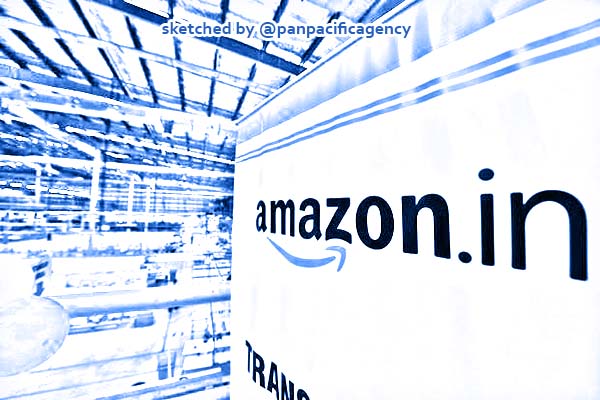Modi govt’s policies for Amazon, Walmart may impede Kirana stores growth

Amazon India boasts of having an enviable selection of bestselling books by acclaimed authors. Photo: Mint. Sketched by the Pan Pacific Agency.
NEW DELHI, Jun 30, 2021, The Mint. For small shopkeepers to climb out of the debt hole they’ve slipped into because of lost revenue and bloated medical bills, they need partners who will help them go digital, The Mint reported.
The list of what e-commerce platforms aren’t allowed to do in India has been growing for some time, but the latest prohibition on flash sales has simply gone too far. If the rules get implemented, the entire business model of Amazon.com Inc. and Walmart Inc. could come unstuck before their investments in a market of 1.4 billion people can grow to a rewarding size.
While a lofty public purpose can always be tacked on as an afterthought to the most draconian of regulations, in this case the fig leaf is thinner than usual. It’s hard to see how “significantly reduced prices, high discounts or any other such promotions or attractive offers” for a period of time “limit customer choice, increase prices and prevent a level playing field.”
The real driving spirit behind the consumer affairs ministry’s new draft guidelines, currently open for public comment, may lie elsewhere. In the garb of checking manipulative behavior by online marketplaces, India is effectively muzzling the two leading U.S. players. It’s also tilting the balance in favor of offline commerce, and away from digital startups that are India’s best bet for rebuilding the pandemic-ravaged economy.
Amazon and Walmart are dominant, but in a tiny corner. Overall e-commerce is only 4% of India’s $800 billion retail market. Yet they’re supposedly exerting such a baleful influence on the natural flow of goods that they must be reined in by, in effect, instructing Amazon not to sell its Made in India Fire TV Sticks — a media streaming device — on its local e-commerce website. Ditto for Walmart. Its physical wholesale operation in the country may not be able to hawk a shirt on Flipkart, the online marketplace it acquired for $16 billion in 2018. And this is when the American retailer is trying hard to blend in. It plans to triple exports from India to $10 billion by 2027, and will float Flipkart in the local equity market.
The Flipkart purchase was Walmart’s most expensive, and perhaps the smoothest moment in its long and turbulent quest to establish a toehold in the country. Soon after the deal, Mukesh Ambani, India’s richest businessman, announced his own ambitious e-commerce plan for linking small independent stores with customers of his then-nascent 4G telecom service. That network now has 420 million-plus subscribers. Ambani is also India’s largest operator of physical stores.
Piyush Goyal, the commerce minister, says that arrogant American firms have blatantly flouted Indian laws. (Amazon and Walmart-Flipkart have denied the charge of abuse of market power in recent court proceedings.) The same reason is being given for the ongoing harassment of Twitter Inc. — it is apparently in breach of rules framed for information technology intermediaries.Twitter has vowed to continue its “constructive dialogue” with the Indian government, and asked for time to comply. But are the rules fair, or do they exceed the remit of the consumer protection and information technology laws framed by parliament? Facebook Inc.’s WhatsApp service has gone to court after being asked to make messages on the platform traceable. The social media firm argues that the requirement will destroy its promise of end-to-end encryption and have a chilling effect on privacy and free speech.
The squeeze on U.S. content firms is guided by political calculations: Twitter’s India offices were visited by the police after the microblogging site branded a tweet by one of Prime Minister Narendra Modi’s party leaders as “manipulated media.” The lawyer Twitter nominated as its grievance officer in India — again to meet new government rules — quit in less than two weeks.
The motivation behind targeting U.S. e-commerce players is not as obvious, though even that is ultimately a political project. Safeguarding the interest of consumers or mom-and-pop stores is how the curbs are marketed to the public, though in reality they’re about eventually putting India behind something resembling China’s Great Firewall. Local tycoons would dominate the market, and while foreign players won’t be completely shunned, they may only be able to join the party as junior partners, supplying technology and capital.